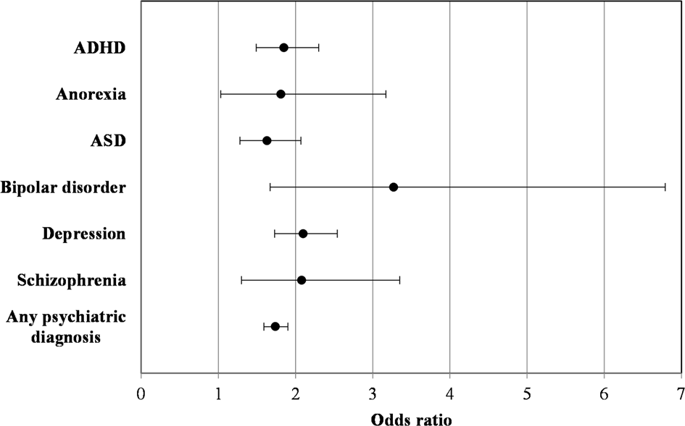当前位置:
X-MOL 学术
›
Transl. Psychiaty
›
论文详情
Our official English website, www.x-mol.net, welcomes your feedback! (Note: you will need to create a separate account there.)
A large-scale genomic investigation of susceptibility to infection and its association with mental disorders in the Danish population.
Translational Psychiatry ( IF 6.8 ) Pub Date : 2019-11-11 , DOI: 10.1038/s41398-019-0622-3 Ron Nudel 1, 2 , Yunpeng Wang 2, 3 , Vivek Appadurai 1, 2 , Andrew J Schork 1, 2 , Alfonso Buil 1, 2 , Esben Agerbo 2, 4, 5 , Jonas Bybjerg-Grauholm 2, 6 , Anders D Børglum 2, 7, 8 , Mark J Daly 9 , Ole Mors 2, 10 , David M Hougaard 2, 6 , Preben B Mortensen 2, 4 , Thomas Werge 1, 2, 11 , Merete Nordentoft 2, 11, 12 , Wesley K Thompson 1, 2, 13 , Michael E Benros 2, 12
Translational Psychiatry ( IF 6.8 ) Pub Date : 2019-11-11 , DOI: 10.1038/s41398-019-0622-3 Ron Nudel 1, 2 , Yunpeng Wang 2, 3 , Vivek Appadurai 1, 2 , Andrew J Schork 1, 2 , Alfonso Buil 1, 2 , Esben Agerbo 2, 4, 5 , Jonas Bybjerg-Grauholm 2, 6 , Anders D Børglum 2, 7, 8 , Mark J Daly 9 , Ole Mors 2, 10 , David M Hougaard 2, 6 , Preben B Mortensen 2, 4 , Thomas Werge 1, 2, 11 , Merete Nordentoft 2, 11, 12 , Wesley K Thompson 1, 2, 13 , Michael E Benros 2, 12
Affiliation

|
Infections and mental disorders are two of the major global disease burdens. While correlations between mental disorders and infections have been reported, the possible genetic links between them have not been assessed in large-scale studies. Moreover, the genetic basis of susceptibility to infection is largely unknown, as large-scale genome-wide association studies of susceptibility to infection have been lacking. We utilized a large Danish population-based sample (N = 65,534) linked to nationwide population-based registers to investigate the genetic architecture of susceptibility to infection (heritability estimation, polygenic risk analysis, and a genome-wide association study (GWAS)) and examined its association with mental disorders (comorbidity analysis and genetic correlation). We found strong links between having at least one psychiatric diagnosis and the occurrence of infection (P = 2.16 × 10-208, OR = 1.72). The SNP heritability of susceptibility to infection ranged from ~2 to ~7% in samples of differing psychiatric diagnosis statuses (suggesting the environment as a major contributor to susceptibility), and polygenic risk scores moderately but significantly explained infection status in an independent sample. We observed a genetic correlation of 0.496 (P = 2.17 × 10-17) between a diagnosis of infection and a psychiatric diagnosis. While our GWAS did not identify genome-wide significant associations, we found 90 suggestive (P ≤ 10-5) associations for susceptibility to infection. Our findings suggest a genetic component in susceptibility to infection and indicate that the occurrence of infections in individuals with mental illness may be in part genetically driven.
中文翻译:

对丹麦人群感染易感性及其与精神障碍的关联进行的大规模基因组研究。
感染和精神障碍是全球两大主要疾病负担。虽然精神障碍和感染之间的相关性已有报道,但它们之间可能的遗传联系尚未在大规模研究中得到评估。此外,感染易感性的遗传基础在很大程度上尚不清楚,因为缺乏对感染易感性的大规模全基因组关联研究。我们利用与全国人口登记相关的大量丹麦人口样本(N = 65,534)来研究感染易感性的遗传结构(遗传力估计、多基因风险分析和全基因组关联研究(GWAS))和检查其与精神障碍的关联(合并症分析和遗传相关性)。我们发现至少一项精神科诊断与感染的发生之间存在密切联系(P = 2.16 × 10-208,OR = 1.72)。在不同精神科诊断状态的样本中,感染易感性的 SNP 遗传力范围为约 2% 至约 7%(表明环境是易感性的主要影响因素),多基因风险评分适度但显着地解释了独立样本中的感染状态。我们观察到感染诊断与精神病诊断之间的遗传相关性为 0.496 (P = 2.17 × 10-17)。虽然我们的 GWAS 没有识别出全基因组的显着关联,但我们发现了 90 种与感染易感性相关的暗示性 (P ≤ 10-5) 关联。我们的研究结果表明,对感染的易感性存在遗传因素,并表明精神疾病患者感染的发生可能部分是由遗传驱动的。
更新日期:2019-11-11
中文翻译:

对丹麦人群感染易感性及其与精神障碍的关联进行的大规模基因组研究。
感染和精神障碍是全球两大主要疾病负担。虽然精神障碍和感染之间的相关性已有报道,但它们之间可能的遗传联系尚未在大规模研究中得到评估。此外,感染易感性的遗传基础在很大程度上尚不清楚,因为缺乏对感染易感性的大规模全基因组关联研究。我们利用与全国人口登记相关的大量丹麦人口样本(N = 65,534)来研究感染易感性的遗传结构(遗传力估计、多基因风险分析和全基因组关联研究(GWAS))和检查其与精神障碍的关联(合并症分析和遗传相关性)。我们发现至少一项精神科诊断与感染的发生之间存在密切联系(P = 2.16 × 10-208,OR = 1.72)。在不同精神科诊断状态的样本中,感染易感性的 SNP 遗传力范围为约 2% 至约 7%(表明环境是易感性的主要影响因素),多基因风险评分适度但显着地解释了独立样本中的感染状态。我们观察到感染诊断与精神病诊断之间的遗传相关性为 0.496 (P = 2.17 × 10-17)。虽然我们的 GWAS 没有识别出全基因组的显着关联,但我们发现了 90 种与感染易感性相关的暗示性 (P ≤ 10-5) 关联。我们的研究结果表明,对感染的易感性存在遗传因素,并表明精神疾病患者感染的发生可能部分是由遗传驱动的。



























 京公网安备 11010802027423号
京公网安备 11010802027423号